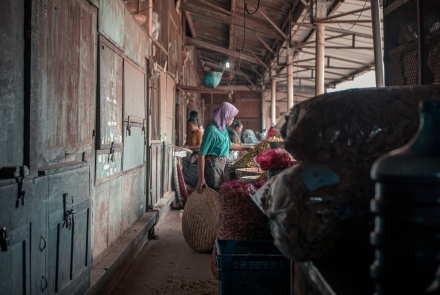
Photo by Wahyu Setiawan on Unsplash
Indonesia’s gender equality report card
While Indonesia appears to be making progress towards gender equity, the country’s latest update on its progress toward the Sustainable Development Goals doesn’t tell the full story, Angie Bexley and Sharon Bessell write.
Endorsed in 2015 by all United Nations member states, the Sustainable Development Goals (SDGs) provide a broad and ambitious agenda for international development. All 17 goals have targets and indicators associated with them, and countries can choose those on which they supply data.
In 2021, Indonesia was ranked as ‘moderately improving’ towards SDG goal number five – gender equality and women’s empowerment. The 2021 dashboard data reveals that Indonesia chose four indicators upon which their assessment was made: demand for family planning, education, the labour force participation rate, and seats held by women in national parliament.
Indicators relating to violence against women and girls and early marriage were included in the voluntary report, but were not submitted for assessment. The most recent SDG assessment, therefore, does not tell the full story of progress towards gender equality in Indonesia, and the country’s remaining challenges.
The SDG reporting notes that the demand for family planning has increased for women aged 15 to 49 years since 2017. While recorded as a success, this metric does not take into consideration regional disparities.
In 2018, a team from The Australian National University, with SurveyMETER, conducted a study in Indonesia, using the Individual Measure of Multidimensional Poverty (known as the Individual Deprivation Measure during its development). The findings highlighted the importance of location to the accessibility of family planning. In our study, almost half of the men and women in the rural area of Pangkep did not use any method to avoid having children.
We also found that family planning is overwhelmingly the responsibility of women, with 43 per cent of women personally using contraception, compared with 8.2 per cent of men. Knowledge of contraception was also lowest among the youngest age cohort, with almost half not knowing any methods of contraception.
The 2021 SDG report also noted that the female to male labour force participation rate had increased. This too was recorded as a success. But again, there is an elephant in the room. The report’s metric does not consider that while women’s participation in the labour force increased, unpaid domestic care did not decrease.
Our study in 2018 found that more women than men were engaged in both paid and unpaid work, and that women performed the greater share of unpaid domestic work and care.
Men were far more likely to report being in paid work only, and were also more likely to spend no time in unpaid domestic work and care. Social norms that uphold inequality within the household remain an area that is resistant to change.
Indonesia’s SDG report showed that women’s political representation has stagnated. But perhaps a more revealing indicator of the progress of gender equality is not women’s leadership, but the rise of conservative religious agendas in Indonesian politics. Recent policy advocacy has sought to push back on progress in gender equality, regulate access to sexual health and reproductive services and impose conservative morality on the country.
The passing of anti-pornography laws in 2008 by Indonesia’s national parliament set the tone for the vocal conservative power in parliament against a coalition of moderates and progressives, both in parliament and civil society. As well as pornography, this bill outlawed what it dubbed ‘pornoaksi’, or actions deemed indecent by authorities. This loosely defined provision has been used to target Indonesia’s lesbian, gay, bisexual and transgender (LGBT) community, among other sections of Indonesian society.
The issue of violence against women and girls is another area where pushback from conservative voices has stymied progress towards gender equality.
Indonesia’s National Commission on Violence Against Women (Komnas Perempuan) have reported that rates of violence against women continue to increase, particularly since the beginning of the COVID-19 pandemic. Still, the Indonesian Government is yet to pass an anti-sexual violence bill, six years after it was introduced, bowing to organised conservative opposition both inside and outside of parliament.
Back on the government’s agenda after a series of high profile allegations, the bill introduces a criminal justice response to sexual violence, having long been considered a ‘private household matter’.
The bill would benefit women with disabilities among others, but President Joko Widodo’s renewed commitment to the bill has yet to see it passed into law.
While Indonesia is considered to be ‘moderately improving’ on some SDG metrics, there is still a long way to go. Unless the country addresses the barriers to gender equality it faces, socially and politically, its progress will be insufficient to attain its gender equality goals by 2030.
Updated: 22 November 2024/Responsible Officer: Crawford Engagement/Page Contact: CAP Web Team













